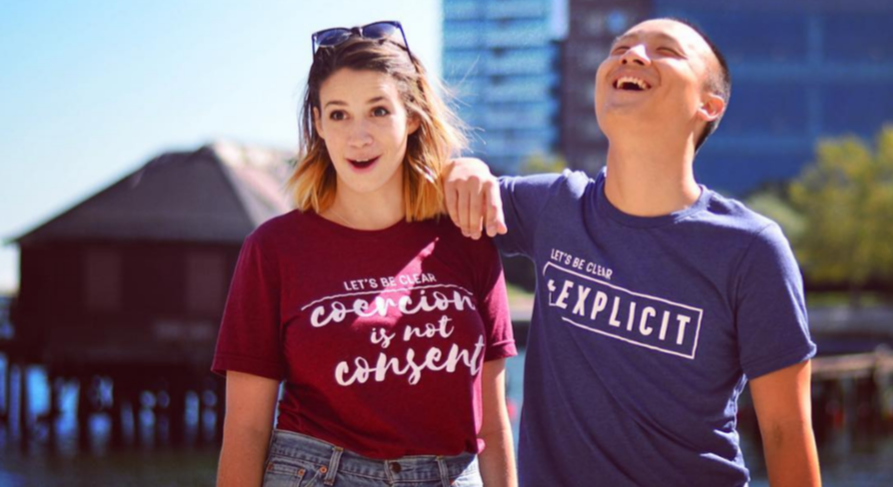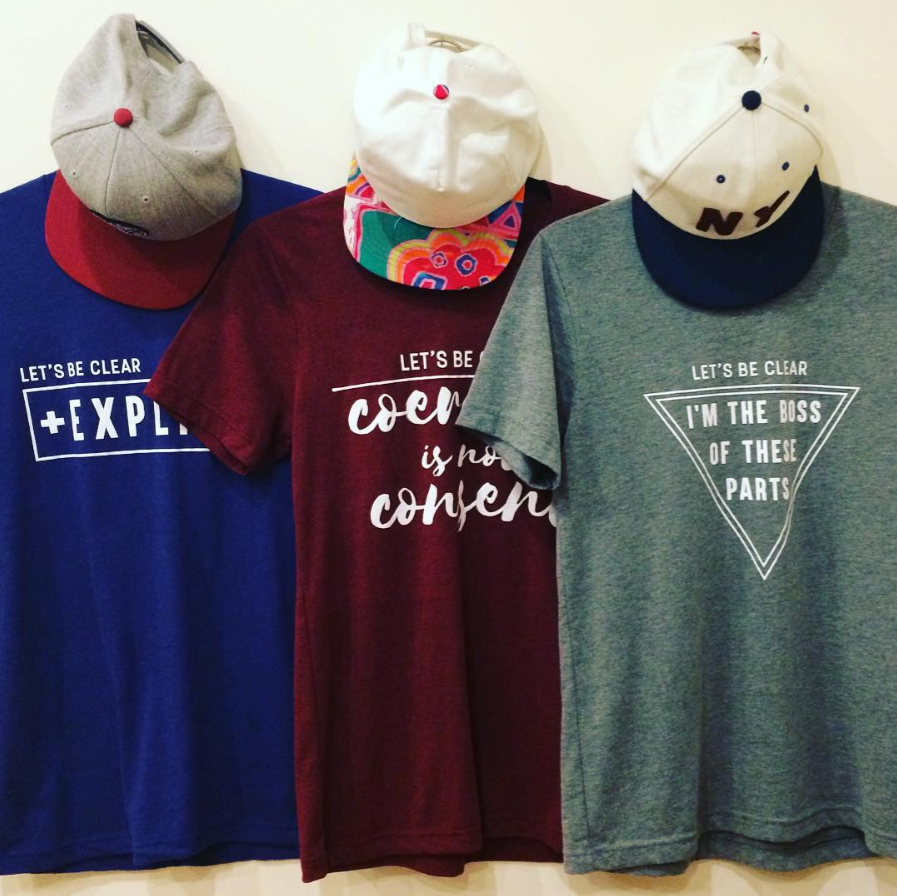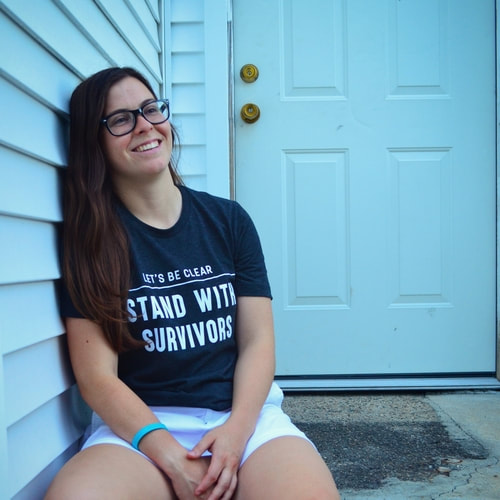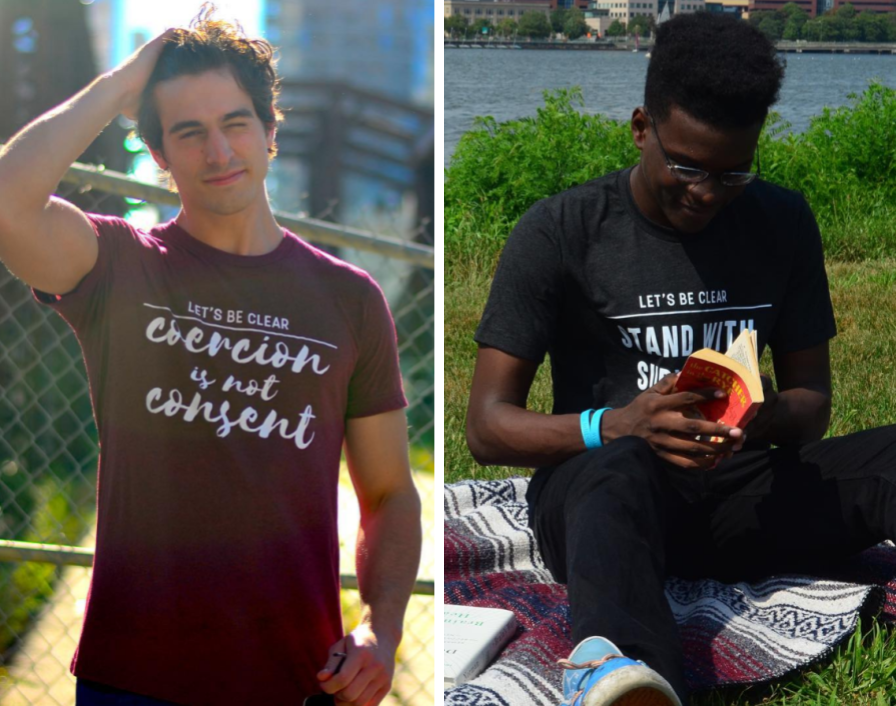|
There is a new apparel company in Boston whose mission is to promote consent! They’re called Let’s Be Clear, and I asked the founder, Rachel Verner, a few prying questions. I don’t know about you, but whenever I find out about someone doing creative consent education in my city, I want to know more As a sidenote, if you’re interested in working on this cause, they’re going to be hiring soon (when their Kickstarter ends). Also, they’re looking for models! If you’re interested in modeling or joining their team, you can email them at [email protected]. Nicole Mazzeo: How do your skills around consent and communication play into your personal life? Do you ever struggle with communicating about consent and sex? Rachel Verner: I’m always trying to learn how to communicate better and I definitely struggle with it. I really mean it when I say that consent isn’t always an easy thing to talk about. When I’m discussing and working on sexual violence prevention every day professionally, it can be hard to transition into honest conversations about consent in my personal life. Plus, when so many people are disclosing to me that they’ve been sexually assaulted and when not enough is being done to prevent sexual violence, it can be really tough to be open — even if only to myself — about what I want or need. I think a lot of the difficulty, for me, stems from not wanting to be vulnerable. You know, you put yourself out there when you ask to kiss someone or ask for something in return. It’s tough because you don’t want to embarrass yourself. You’re in the moment and all this anxiety starts to bubble up (at least if you’re me!). But at the end of the day, the most important thing to remember is that being embarrassed is so inconsequential in comparison to what can happen if you don’t communicate. I’m trying to work on increasing my own openness and confidence through yoga. I just started about a month ago. Having played competitive sports my whole life, it’s very different, but I’m finding it quite helpful in terms of listening to my body more and understanding my emotions. Those are two of the things I have the hardest time with. Even my mom commented that she’s noticed a difference, so I guess it’s improving my communication and emotional awareness across the board! NM: Why do you choose to use apparel as your main method of encouraging people to practice consent? What is your philosophy for doing activism? RV: Apparel struck me as a good way to lower the barrier of entry into conversations about consent and sexual violence prevention. I’ve never been a particularly loud person, so having something like a t-shirt that can help initiate dialogue seemed really helpful. Plus, having messages about consent on a t-shirt helps increase others exposure to the idea that consent is important - and the more we’re exposed to any given message, the more likely we are to incorporate that message into our ideology. My approach to sexual violence prevention is pretty deeply rooted in social psychology. In order to create change, we need to construct conversations in such a way that everyone feels welcome. We need to have conversations that people are excited about participating in and we need to re-frame complex issues in a way that makes sense to everyone. NM: How do you balance having a social justice mission with being a for-profit company? RV: This is one of the things we went back and forth on a lot when we were starting Let’s Be Clear. I think the balance for us really comes from using our clothing to fund education. Federal funding for not-for-profits is so limited. There are a ton of great organizations out there that really need that funding and we felt like, because we’re selling a product, we’d be able to stand on our own financially. Plus, there’s a lot of red tape that comes with being a not-for-profit. We wanted to have the flexibility to spend our money in a way that would maximize our ability to get the word out about Let’s Be Clear and consent. As we grow, our plan has always been to become a B Corp — a “Benefit Corporation”. Unlike most for-profits, B Corps place the emphasis on doing good. So rather than driving the company to maximize profit, B Corps drive the company to maximize impact. That’s what we’re trying to do. The only reason we’re not a B Corp now is because it’s expensive to become (and run) one! NM: Why did you switch from making underwear to making outerwear? RV: When Let’s Be Clear originally started, it was more of a student project. The underwear was a fun way to engage my college campus. But when we shifted to think about Let’s Be Clear as a business, we had to think about how best to build brand awareness. You can wear a t-shirt for a day and hundreds of people might see it; there are very few circumstances in which the same can be said for underwear! Also, finding wholesale underwear that meets our ethical, environmental, and quality standards is tough. There aren’t many companies out there that produce underwear and we’re not comfortable putting out a product that doesn’t represent consent all the way through the production chain. That said, we have been working hard to re-introduce the underwear and are hoping to have some on the shelves in 2017! NM: I’m super interested in your “How to go on a better date,” "How to have better sex,” and “How to mix: Sex + alcohol” workshops. I also lead workshops on consent, and I’m always curious about the ways that other people approach these topics. How did you come up with the concepts for these workshops? What is your vision for them? RV: The concepts for these workshops came from some of the most common themes around and questions about consent — What does consent look like outside the context of sex? How do I get consent while having sex without killing the mood? What about having sex when you’re drinking — can you ask for or give consent? Our goal was to frame the answers to these questions in a way that’s really relatable. We’re trying to build workshops that attract a wide audience. I’ve spoken with a lot of people who said they didn’t feel like they had a place in workshops about consent because they weren’t a survivor, or they didn’t want to make anyone uncomfortable, or they didn’t know enough about consent to contribute. Our hope is that, by teaching consent through a different lens, we’ll be able to break down all those barriers and get more people talking and learning. Who doesn’t want to go on a better date? Or have better sex? For instance, in the "how to go on a better date” workshop, we focus on how clear communication can improve your relationships — whether they’re brand new or years old. It’s tailored to the audience, so for college kids we get into hook-up culture, while for high schoolers we place more emphasis on school dances and that kind of thing. We take an activity based approach and try to really emphasis critical thinking in real life scenarios to help people learn (and later apply) healthy communication skills. NM: What is your strategy for making consent education more inclusive? RV: We’re making consent education more inclusive by offering free (or seriously discounted) workshops to populations that otherwise don’t have access to this kind of education, whether that be because of socioeconomic status, class, location, age, religious limitations, or anything else in that realm. * * * To back Let’s Be Clear, or just to check out their product line (and their very cute models), visit their Kickstarter! This article was also posted on Fabulously Feminist Magazine.
Comments are closed.
|





